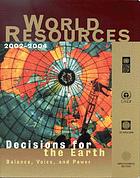
World resources 2002-2004 : decisions for the earth : balance, voice and power
By - World Resources InstituteWho Should Decide Where to Build a Road or Locate a Dam? When is the public consulted? Can people appeal decisions they find unfair? World Resources 2002-2004 examines how we make environmental decisions and who makes them, which is the process of environmental governance. The report argues that better environmental governance is one of the most direct routes to fairer and more sustainable use of natural resources. Decisions made with greater participation and greater knowledge of natural systems -- decisions for the Earth -- can help to reverse the loss of forests, the decline of soil fertility, and the pollution of air and water that reflect our past failures. Tenth in the biennial World Resources series on the global environment, the report defines governance in everyday terms, with reference to a wealth of case studies. It assesses the state of environmental governance in nations around the world and summarizes results from the Access Initiative, a first-ever attempt to systematically measure governments' performance in providing their citizens access to environmental information, decision-making, and justice. World Resources 2002-2004 also presents a wealth of national statistics on current environmental, social, and economic trends in more than 150 countries. The report departs from previous editions by making the full World Resources database freely accessible and searchable on-line in the companion website, Earth Trends (http://earthtrends.wri.org). The award-winning Earth Trends site also provides data tables, country profiles, maps, and feature stories about current conditions. In addition, the World Resources database is published on CD-ROM with mapping software as TerraViva! World Resources. The World Resources series is produced by a unique collaboration of the United Nations Development Programme, the United Nations Environment Programme, the World Bank, and the World Resources Institute.